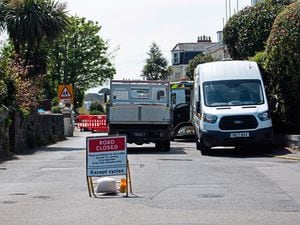Open Market history in brief
Continuing his series of property articles, estate agent Trevor Cooper considers the background of the Open Market...

Continuing his series of property articles, estate agent Trevor Cooper considers the background of the Open Market...
IN FEBRUARY 1948, the Housing Authority advised the States of Deliberation of an 'increasingly grave housing situation' and the need to take 'far-reaching measures of control'.
The States approved the introduction of the Housing Control (Emergency Provisions) (Guernsey) Law, 1948, requiring anyone not ordinarily resident in Guernsey to apply for a licence before occupying any dwelling on the island.
This legislation was to protect the island's limited housing stock in the post-Second World War years. Many people were returning to Guernsey and a shortage of building materials continued to prevent significant development.
A Housing Authority report in 1952 gave the first clear reference to what we now know as the Open Market.
The States Population Policy Group last year launched a wide-ranging and ongoing review of Guernsey's current housing situation. Controversial, but too often misconstrued and misquoted, this review is intended to form the basis of a legal and administrative framework for a population management regime.
One of the features of the review by the PPG is a supplementary document – a detailed and enlightening history of the Open Market, for which this article is hugely indebted.
It explains that the 1952 report stated that, 'Regarding well-to-do people who wish to settle in the island, the Housing Authority fully realises the value of such people to the community and every possible encouragement is given, short of releasing rent-controlled dwellings.'
The report also noted that houses built since 1945 with a rateable value above £75 were of 'little value' in solving the housing shortage and that licences were being granted to those wishing to purchase such a property. Tax on Real Property has replaced the rateable value system in Guernsey. There is little correlation between them – perhaps a RV of £75 is equivalent to a TRP of 280.
This was lowered in April 1957, when a States amendment to the 1948 law made dwellings with a rateable value above £50 (say, TRP 200) exempt from housing controls. The loss of larger dwellings, the Housing Authority reported, would not seriously affect the housing shortage.
Some owners, however, improved their properties purely to achieve a rateable value above the £50 threshold to become exempt from housing controls.
The Housing Authority advised the States in 1961 that, if the practice continued, there may be a serious deterioration in the housing situation.
So, the States approved an amendment that only properties assessed at over £50 rateable value before 1st January 1963 would be exempt from controls.
Meanwhile, back in December 1958, the States agreed to purchase Fort George from the War Department. Between March 1960 and March 1961, the States decided that a large part of Fort George should be sold for development as a 'high standard residential estate'. The proposal was for between 130 and 145 houses to be built.
The opposition was great, not only among the general public but also within the States itself.
A closer look at Fort George will feature in a future article, including details of the requete taken to the States with a 10,000-signature petition – 21% of the island's population at the time.
Another landmark in the evolution of the Open Market was in 1966.
The £50 rateable value threshold no longer reflected the demand for housing by those that the 1948 law first set out to protect. The Housing Authority reported that dwellings constructed with a rateable value in excess of £50 were having a serious inflationary effect. There was reluctance to recommend measures with the effect of 'deterring newcomers from sharing our way of life', but the conclusion was that unless the wave of development for newcomers was reduced the cost of development land and construction would rise, to the general detriment of housing.
The States approved the Housing Authority's proposals and, in September 1966, the rateable value threshold for exempt properties was raised to £85.
But high inflation in the construction industry, rapidly rising house prices and higher standards of living meant the island's housing situation worsened. Properties being combined to create one unit with a £85-plus rateable value was another concern.
The 1948 law had to be repealed, according to a 1967 proposal, and replaced with a new housing control-based regime, strengthening provisions for dealing with any breaches and closing loopholes for exempt properties.
Consequently, the Housing Control (Guernsey) Law, 1967 was enacted.
This was still not enough. In July 1968, concerned by an increase in the proportion of new homes being built with a rateable value above £85, the Housing Authority said the 1967 law needed to be replaced and additional provisions brought in.
But the Advisory and Finance Committee did not support this. It believed the proposals would be difficult to enforce and questioned if they would achieve the desired objective – to reduce the rate at which building costs were increasing.
The States deferred the matter and appointed an Investigation Committee under the chairmanship of Deputy Henchman to report on the housing problem and its relationship with wider aspects of the economy.
Great deliberation ensued over the aims and intentions of the laws, amendments and Treasury budgets between 1957 and 1962. The Investigation Committee recognised the increase in demand for development land – the need was to balance these demands against the general well-being of the community and environment.
A register of properties exempt from housing controls would be created and the Investigation Committee defined those allowed to be inscribed. There would be restrictions on individuals and on which newly-built houses could be added to the register. Ordinance would empower the Housing Authority. The report was precise and exhaustive with the hope that, 'Dwellings in the private sector might become more readily available to those with moderate incomes'.
The recommendations were approved without amendment and the Housing Control (Guernsey) Law, 1969, was enacted.
But in March 1971, a requete to the States raised concerns about the 1969 law, its implementation and how the Housing Authority was interpreting its discretionary powers.
Only 950 of the estimated 2,200 eligible properties had been inscribed, rising to 1,011 by the time of the States debate in February 1973. A more robust approach to enforcing the 1969 law was approved but did not take effect until the implication of the Housing Control (Guernsey) Law, 1975.
And all this time it was proving increasingly difficult to determine the status of a property at the point it first became an exempt dwelling. The new housing law due in November 1982 would close the register to new inscriptions. This would also apply to what was known as 'concession' houses.
The Housing Register was also sub-divided to differentiate between private residences (Part A) and hotels and guest houses (Part B). Further sub-division in 1984 saw categories for nursing homes (Part C) and lodging houses (Part D).
A review in September 1990, ahead of the expiry of the 1982 law, recommended the Housing Control regime be retained largely unaltered, other than identifying permitted occupants such as staff and the future long-term rights of Open Market residents' children. The current Housing (Control of Occupation) (Guernsey) Law, 1994 was subsequently enacted.
Before now, the previously most recent Housing Authority review was in March 2001, preparing a policy for Open Market inscriptions to be included in prestigious new developments. This would apply to Mixed Use Redevelopment Areas such as Marina Court and Admiral Park. For each unit inscribed an existing dwelling must be deleted from Part A, without conferring local market status on the house owner.
The current review by the Population Policy Group is the latest in a long line of regular appraisals. The Billet d'Etat from January this year proposed retaining the Open Market with only described changes. The final outcome is much anticipated, as no doubt it was for the many past reviews.





